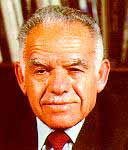Yitzhak Shamir
(1915 - 2012)

Yitzhak Shamir was a Israeli soldier and politician who served as Prime Minister of Israel from 1983 to 1984 and again from 1986 to 1992.
Shamir was born on October 22, 1915, in Ruzinoy, Poland where he attended the Bialystok Hebrew Secondary School and became an active member of Ze’ev Jabotinsky’s Betar Zionist youth movement. In 1935, at the age of 20, Shamir interrupted his law studies in Warsaw to move to British Mandatory Palestine, where he enrolled at the Hebrew University in Jerusalem.
Soon after arriving in Palestine, Shamir joined the Irgun Zvai Leumi and, in 1940, followed Avraham Stern into the Lohamei Herut Yisrael (Lehi), another – more violent – underground defense organization. The following year he was imprisoned by the British authorities but, in 1943, he escaped from the British detention camp and soon became one of the Lehi’s principal leaders.
Shamir served as Lehi’s principal director of operations until 1946, when he was detained again by the British and exiled to a British-run prison camp in Eritrea. In 1947, he escaped from that camp as well, made his way to the neighboring French colony of Djibouti, and was later granted political asylum in France. Upon his return to Israel, Shamir took back his command of the Lehi, a position he would hold until the organization disbanded after the formation of the Israel Defense Forces.
After managing several commercial enterprises, Shamir joined the Mossad in the mid1950’s. He returned to private commercial activity in the mid1960’s, when he became active in the campaign to free Soviet Jewry and joined Menachem Begin’s Herut movement, which evolved into the Likud Party.
Elected to the Knesset in 1973 as a member of the Likud, Shamir served on the Foreign Affairs and Defense Committee and the State Comptroller’s Committee. Upon reelection to the Knesset in 1977, he became Speaker, in which capacity he presided over the historic visit of Egyptian President Anwar Sadat and the debate over the peace treaty with Egypt.
Following the resignation of Moshe Dayan, Shamir joined the Begin Cabinet as Foreign Minister in March 1980, and continued in this position after the 1981 elections. He guided negotiations on the post-treaty “normalization” process with Egypt, and initiated diplomatic contacts with numerous African countries which had severed relations with Jerusalem during the Yom Kippur War. Following Operation Peace for Galilee in 1982, Shamir directed negotiations with Lebanon which led to the 1983 peace agreement (never ratified by the Lebanese government).
In October 1983, Shamir succeeded Menachem Begin as Prime Minister. Following the 1984 election, he became Vice Premier and Foreign Ministry in the Government of National Unity.
Together with Defense Minister Moshe Arens, Shamir worked with President Ronald Reagan and Defense Secretary Casper Weinberger to create a framework for U.S.-Israel strategic cooperation and the U.S.-Israel Free Trade Agreement. In midterm, Shamir returned to the premiership, rotating positions with Labor leader Shimon Peres.
Following the 1988 elections, Shamir again created a National Unity Government with Labor, but without the “rotation” element of its predecessor. This government fell in 1990 due to a vote of no confidence in the Knesset, but, following a protracted stalemate, Shamir succeeded in forming a narrow coalition government.
In May 1991, Shamir ordered the airlift rescue of thousands of Ethiopian Jews, codenamed “Operation Solomon.” In September 1991, he represented Israel at the Madrid Peace Conference which brought about direct negotiations with Syria, Jordan, Lebanon and the Palestinians.
Defeated in the 1992 election, Shamir stepped down from the party leadership and retired from the Knesset in 1996.
In 2001, Shamir was awarded with the annual Israel Prize in recognition of his lifetime achievements and special contributions to the society and wellbeing of the State of Israel. In 2004, Shamir’s health declined rapidly, with the onset of Alzheimer’s Disease and he was subsequently moved into a private nursing home. The following year he was voted the 29th-greatest Israeli of all time through a poll conducted by the Israeli newspaper Yediot Aharonot.
On June 30, 2012, Shamir died while at the nursing home he was living in in Tel Aviv. He was 96 years old. He was a given a state funeral on July 2 and buried amongst Israel’s other war heroes and prime ministers on Har Herzl in Jerusalem.
Israeli President Shimon Peres said that “Yitzhak Shamir was a brave warrior for Israel, before and after its inception. He was a great patriot and his enormous contribution will be forever etched in our chronicles. He was loyal to his beliefs and he served his country with the utmost dedication for decades. May he rest in peace.”
Photo: Nationaal Archief licensed under the Creative Commons Attribution-Share Alike 3.0 Netherlands license.


